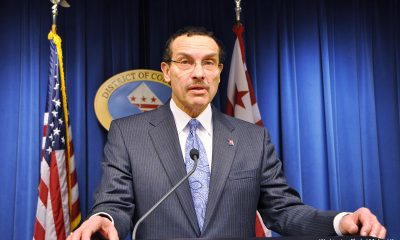World
New World Bank US executive director: LGBTQ rights are human rights
Felice Gorordo assumed role last year
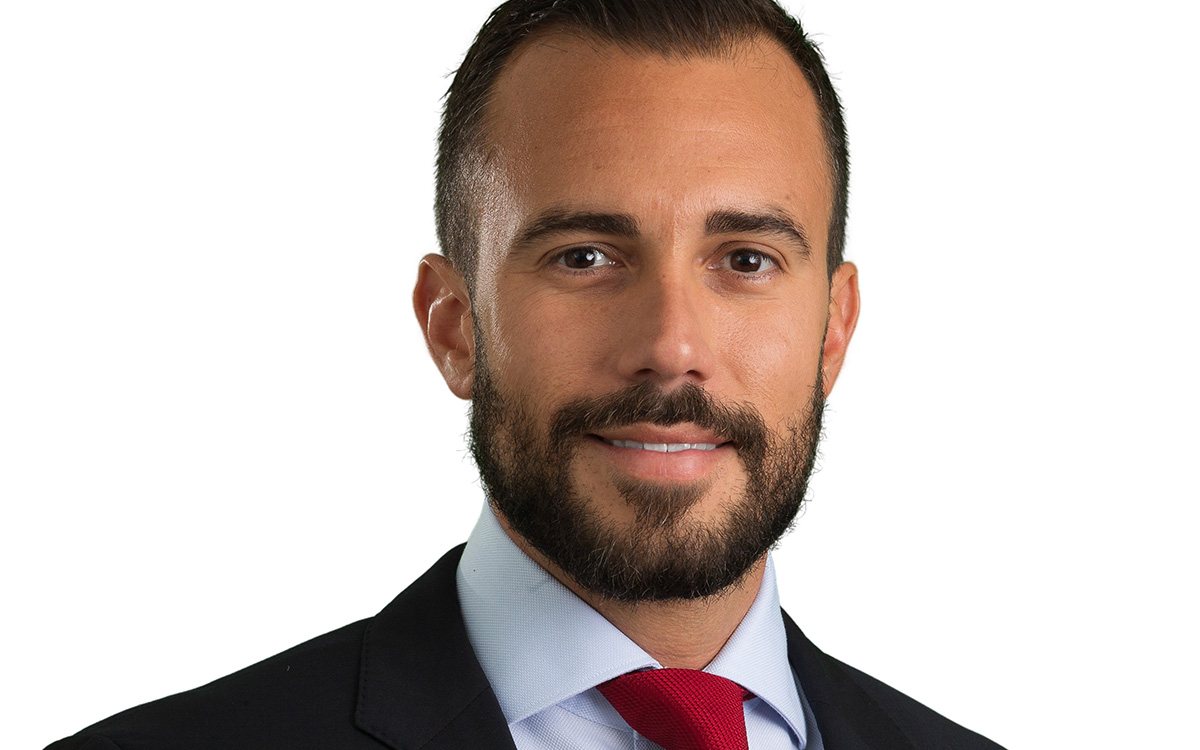
Acting U.S. World Bank Executive Director L. Felice Gorordo recently told the Washington Blade that he is committed to the advancement of LGBTQ and intersex rights within the multilateral organization.
“LGBTQI+ rights are human rights and human rights are LGBTQI+ rights. Period. Hard stop,” he said during an exclusive interview at his D.C. office on March 27. “I see it, personally, from a human rights promotion lens.”
Gorordo, a Cuban American who was born in Miami, graduated from Georgetown University in 2005.
He co-founded Roots of Hope, an organization that seeks to empower young Cubans on the island through entrepreneurship and increased access to technology.
Gorordo served in various roles in both the Obama and George W. Bush administrations, and served as advisor to then-Vice President Joe Biden’s cancer initiative after his mother died from pancreatic cancer.
He has also been the CEO of three-venture backed technology companies, an investor and advisor at two venture capital funds with focuses on global healthcare and infrastructure, and has sat on the boards of several for- and non-profit organizations. Gorordo was most recently the CEO of eMerge Americas and executive director of the Technology Foundation of the Americas before the U.S. Senate confirmed him in May 2023.
He has been the World Bank’s acting U.S. executive director since Adriana Kugler joined the Federal Reserve Board.
Gorordo, 41, throughout the interview referenced the Biden-Harris administration’s 2021 memo that committed the U.S. to promoting LGBTQ and intersex rights abroad as part of U.S. foreign policy.
“It starts off with us at the bank trying to build demand for the issues related to LGBTQI+ rights and people,” he said. “It’s about protecting LGBTQI+ rights in and outside of World Bank operations and projects and supporting LGBTQI+ people and rights inside and outside of our projects through inclusion. It’s using our voice and vote at every chance that we get to advance LGBTQI+ people.”
Gorordo pointed out his office reviews roughly 700 projects a year for the World Bank, and they have an average of $90-$100 billion in financial commitments. He said there is a “pretty extensive review process for due diligence” with criteria that include environmental and social frameworks and bank safeguards (that currently do not explicitly include sexual orientation or gender identity.)
“We take a critical lens at each one that it lives up to the values that we want to promote, and that includes looking at it through the lens of LGBTQI+ rights,” said Gorordo.
One LGBTQ-inclusive project is the World Bank International Finance Corporation’s $275 million loan to Banco Davivienda in Colombia, which provides funding for advisory services to LGBTQ and intersex people and for the design of LGBTQ and intersex banking products. The board in 2023 greenlighted $200 million for the Program for Universal Primary Healthcare Coverage and Resilience which, among other things, seeks to improve the quality of healthcare that LGBTQ and intersex people receive in Chile.
The World Bank’s EQOSOGI Project has already collected LGBTQ- and intersex-specific data on legal gaps as well as practices that impact LGBTQ and intersex people in 16 countries, and it plans to expand its work to other nations in 2024. The World Bank is also expanding its research on the economic costs of discrimination based on sexual orientation and gender identity.
The first studies focused on Serbia and North Macedonia, and found both countries’ annual gross domestic product would increase by .6 percent if LGBTQ and intersex people faced less discrimination in the workplace. A study that will focus on Brazil will be released later this year.
“There’s always more we can do,” Gorordo told the Blade. “What we believe we need to do, again, using our convening power and our voice and our vote is to help build because in the end we are still a demand-driven organization.”
“We need to use our research and the data, in my opinion, our opinion, to help generate the demand for LGBTQI rights to be enshrined in our safeguards, in our strategies and in every single one of our products and the data speaks for itself,” he added.
Gorordo also noted the bank in the coming months will release a new gender strategy that recognizes gender as nonbinary.
“That’s a big step,” he said.
Gorordo described World Bank President Ajay Banga as “a champion of the rights of all, including LGBTQI+ people.” Gorordo, however, acknowledged there has been “some pushback from certain constituencies that have different views and opinions than ours” on the new gender strategy and support for LGBTQ and intersex rights.
“I see it as my responsibility to not just advocate for it in the board room or with management, but also using my office and chair to meet with other chairs bilaterally, to make the case for it, to try and bring folks along with us,” he added.
Uganda’s Anti-Homosexuality Act ‘needs to be struck down and repealed’
The World Bank last August suspended new loans to Uganda in response to the country’s Anti-Homosexuality Act that President Yoweri Museveni signed.
Uganda’s Constitutional Court earlier this month refused to nullify the law. A group of Ugandan LGBTQ activists have appealed the ruling.
“The law needs to be struck down and repealed. Hard stop,” said Gorordo. “We continue to advocate for that.”
Then-World Bank President Jim Yong Kim in 2014 postponed a $90 million loan to the Ugandan government in response to Museveni’s decision to sign a nearly identical version of the Anti-Homosexuality Act, known as the “Kill the Gays” law that imposed a life sentence upon anyone found guilty of repeated same-sex sexual acts.
Uganda’s Constitutional Court later struck down the law on a technicality, but Kim’s decision to postpone the loan without first consulting the World Bank’s board sparked widespread criticism among board members. Advocacy groups had asked the World Bank not to fund future projects in Uganda, but they did not ask for the cancellation of existing loans.
The World Bank earlier this year organized a seminar with the Human Rights Promotion Forum of Uganda that upwards of 50 people attended virtually and in person.
“One of the things that I think is incredibly critical is hearing directly from those we seek to serve and who are being impacted by these discriminatory laws,” said Gorordo.
Gorordo said the World Bank in lieu of the law’s repeal has “been doing a review of mitigation efforts” that includes “a three-month trial period once there is an agreement of what those mitigation efforts would be, to see if they are fit for purpose.”
“At the crux of it includes the protection as well as the equal access of benefits for LGBTQ communities in Uganda. If it is not fit for purpose, then we have to go back to the drawing board., So we will continue to push for the strictest mitigation measures that can be put into place, a very critical review through that process … and ensuring that we are able to guarantee equal access and protection for the LGBTQ community.”
Ghanaian President Nana Akufo-Addo has delayed a decision on whether he will sign a bill that would further criminalize LGBTQ people in his country. Lawmakers in Kenya and Tanzania have proposed similar measures.
“One of the reasons why we’ve taken such a critical view of the Uganda case is this is potentially one of many of these types of cases that we’ll have to deal with,” said Gorordo. “What we do in Uganda could have a ripple effect in other countries and we need to ensure that we are setting the right precedents for how we react in these cases.”
Gorordo further noted consensual same-sex sexual relations remain criminalized in upwards of 60 countries around the world.
“The discrimination that’s against LGBTQI+ people is unacceptable across the board,” he said. “We will use all the tools in the U.S. government’s toolbox to be able to make it known our objection and to try and stop discrimination and protect the rights of LGBTQ+ people every chance we get.”
South America
Peruvian government classifies transgender people as mentally ill
President Dina Boluarte signed decree on May 10
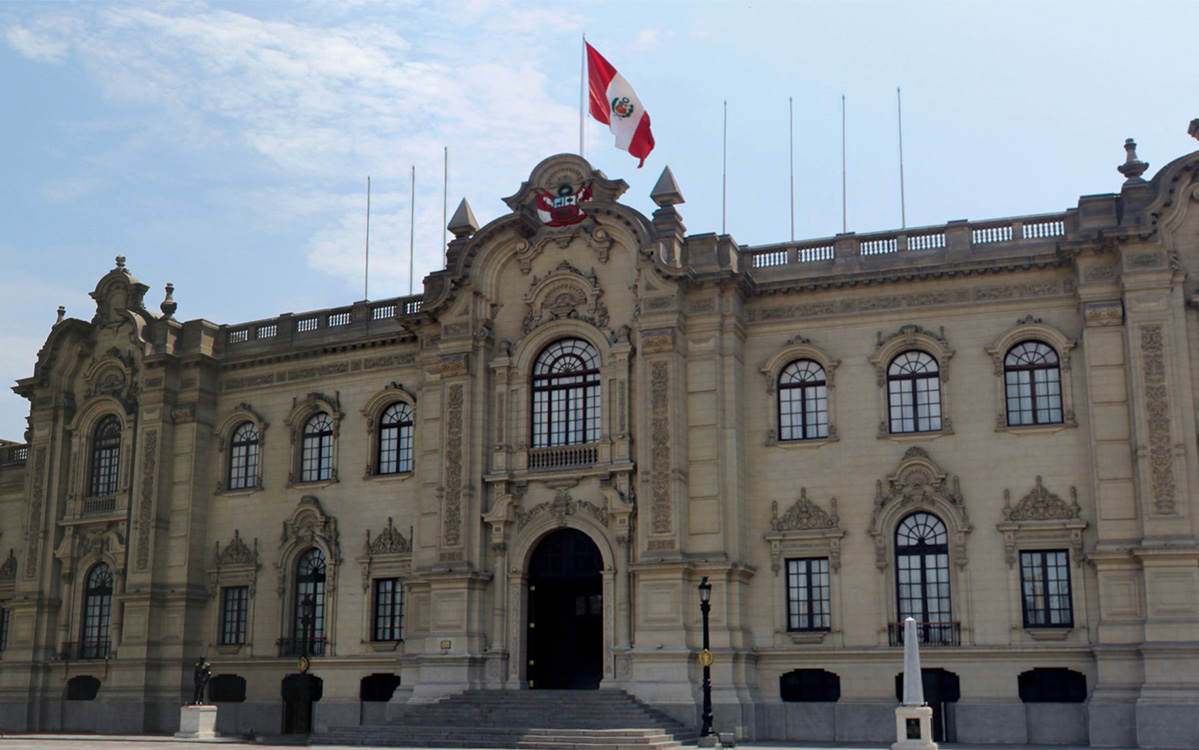
The Peruvian government on May 10 published a decree that classifies transgender people as mentally ill.
Human Rights Watch on Wednesday noted the country’s Essential Health Insurance Plan that President Dina Boluarte, Health Minister César Vásquez and Economic and Finance Minister José Arista signed references “ego-dystonic sexual orientation.” The decree also notes, among other things, “transsexualism” and “gender identity disorder in childhood.
Human Rights Watch in its press release notes the Health Ministry subsequently said it does not view LGBTQ identities as “illnesses.” Peruvian LGBTQ advocacy groups, however, have sharply criticized the decree.
“This decision is an alarming setback in our fight for the human rights of trans people in Peru, and it represents a serious danger to our health and well-being,” said Miluska Luzquiños, a trans activist who works with the Latin American and Caribbean Network of Trans People, which is known by the Spanish acronym REDLACTRANS, on her Facebook page.
A lack of legal recognition and protections has left trans Peruvians vulnerable to discrimination and violence.
Luisa Revilla in 2014 became the first trans person elected in Peru when she won a seat on the local council in La Esperanza, a city in the northwestern part of the country.
She left office in 2019. Revilla died from COVID-19 in 2021.
Africa
Kenyan advocacy group offers safety tips to LGBTQ hookup app users
Blackmail, kidnappings and assaults are commonplace

The growing cases of queer people in Africa becoming victims of blackmail, physical and sexual assault from online hook-ups have compelled a Kenyan LGBTQ rights group to work with the community to help it stay safe when using digital platforms.
Upinde Advocates for Inclusion held a 3-day training from May 11-14 to teach queer people about unsafe social media and dating app hook-up practices that suspected homophobes exploit.
The Mombasa-based group of which Lizzie Ngina is executive coordinator noted lesbian, bisexual and queer women, and gender non-conforming people are the most frequent targets online and on Grindr and other dating apps.
“LBQ women and GNC persons confront major challenges in terms of digital security and data protection, freedom of expression, assembly, association, speech, privacy, protest and online organizing,” Upinde Advocates for Inclusion stated.
Although the digital platforms were seen as convenient meet-up places for LGBTQ people in overcoming physical anti-gay attacks, Upinde Advocates for Inclusion said anti-gay discrimination, marginalization, gender-based violence, misinformation, and disinformation limits LGBTQ and gender non-conforming people from accessing the social media services.
Queer people while using dating apps and social media for hookups were, however, urged to first trust their intuition before deciding to have a physical meeting with people with whom they chat online.
“If it does not seem like someone you are messaging is using their true identity, they probably are not. In this case, do not agree to meet them in person,” Upinde Advocates for Inclusion warned.
It asked LGBTQ users to ensure the first in-person meeting with someone they met online is in a public place that is queer-friendly and known to them. Upinde Advocates for Inclusion also advised queer people to inform their trusted friends or family about their meeting plans, the place, and how long they expect it will take place in order to ensure someone can intervene if something goes wrong.
“Organize your own means of transport to and from the meeting, and do not accept a free ride from a stranger,” the group warned. “Also, do not move to a secondary location if you feel unsure during the meeting.”
Upinde Advocates for Inclusion also warned queer app users to remain sober during the meeting and cautioned against leaving their food or drinks unattended in order to avoid any potential risks associated with spiking.
The National Gay and Lesbian Human Rights Commission, Ishtar-MSM and other Kenyan LGBTQ advocacy groups that offer legal aid to queer people last year reported about 100 cases of blackmail, extortion, physical and sexual assault against their members by suspected homophobes they met on dating apps and social media.
The two organizations this month noted 10 of the cases are expected before courts soon, although they said most victims of anti-gay attacks don’t report them to the authorities because they fear further stigmatization and discrimination. Consensual same-sex sexual relations also remain criminalized in Kenya.
Targeting the LGBTQ community on digital platforms and dating apps is not unique to Kenya.
The Washington Blade last month reported it is still risky for queer Nigerians to search for a partner or to use gay dating apps infiltrated by homophobes who lure them to meet in-person and then rob or assault them. South African authorities last year arrested four men in connection with the targeting of Grindr users.
LGBTQ Kenyans urged to protect themselves at protests
Upinde Advocates for Inclusion in their workshop taught participants about the signs that suspected homophobes or their associates have compromised their devices. They include unusual activities on their cell phones that include calls with untraced history, disappearing blank messages, blinking screens, high data consumption, devices that overheat when not in use and echo when picking calls and quick battery depletion with minimal use.
“If you suspect your device is compromised, do not format or reset it, log out all the accounts, find an alternative device to use, change the password for the accounts on the device, and do not connect the gadget to any other devices,” Upinde Advocates for Inclusion warned.
The group also taught queer people about how they should conduct themselves when taking part in street protests amid anti-gay attacks. Upinde Advocates for Inclusion advised them to always to identify safe alternative routes to and from the protests, wear comfortable running shoes, and always carry a spare outfit that is not LGBTQ-specific.
“If you are in a group, always strategize on having a meeting point should there be any danger or should you get separated,” the group stated. “Also, try to split up responsibilities among the group so that one person can’t be targeted.”
Upinde Advocates for Inclusion also urged queer people to always leave a protest before it ends, to have an emergency contact on speed dial or memorize it for immediate help in case of danger and to always to keep in touch with a trusted contact who is familiar with the protest but not attending it.
European Union
Gay Ukrainian man struggles to rebuild life in Berlin
Dmytro Shapoval arrived in Germany in March 2022
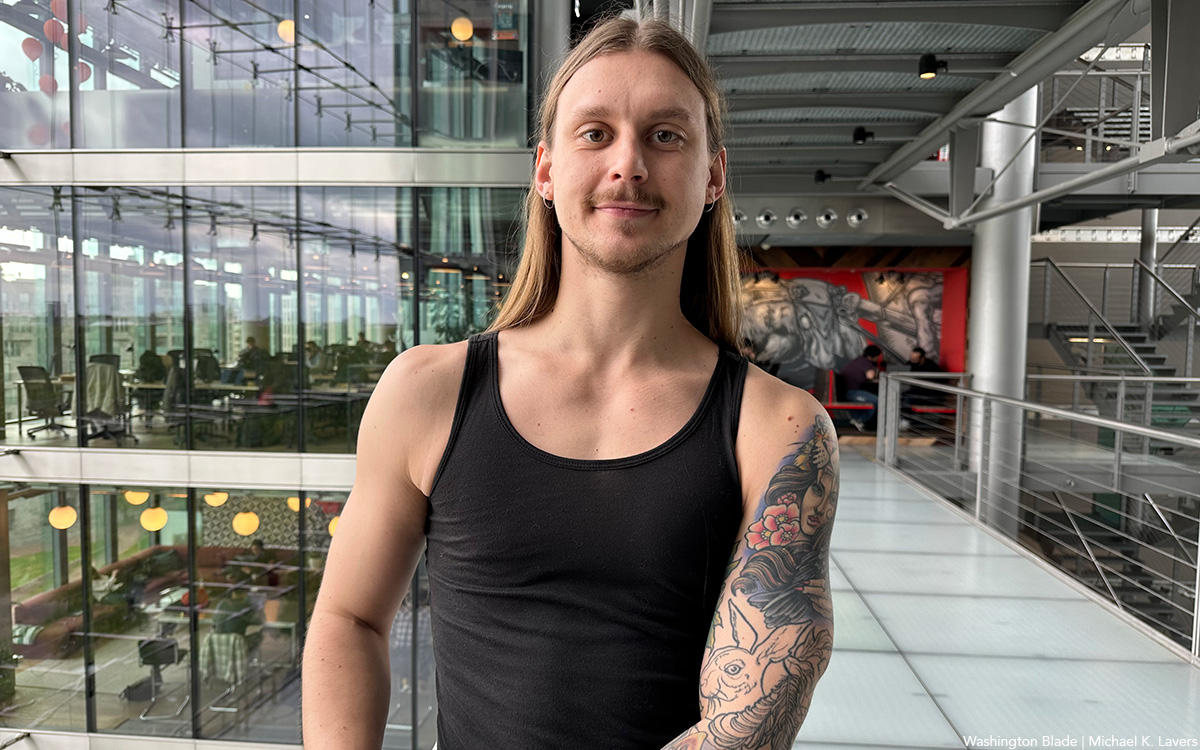
Editor’s note: International News Editor Michael K. Lavers was on assignment in Berlin from April 12-15.
BERLIN — A gay Ukrainian man with HIV who fled his war-torn country more than two years ago remains in Berlin.
Dmytro Shapoval first spoke with the Washington Blade in July 2022.
He was working at an IT company’s call center and studying web and UX design in Kyiv, the Ukrainian capital, when Russia launched its war against his country on Feb. 24, 2022. Shapoval less than a month later swam across a river with his cat Peach and entered Poland.
He arrived in the German capital on March 19, 2022.
“I feel very secure here,” said Shapoval when he first spoke with the Blade on July 22, 2022, during a reception that took place at the end of a two-day meeting with European activists the Organization for Refuge, Asylum and Migration organized.
Shapoval again spoke with the Blade on April 15 while he was at ORAM’s offices near Berlin’s Potsdamer Platz.
He said he was sleeping on a mattress on the kitchen floor of a Ukrainian friend’s apartment in Berlin’s Wedding neighborhood, while looking for a more permanent place to live.
Shapoval had just finished an IT course at a private university, but told the Blade he “was not in that headspace to study” because of the depression from which he said he suffers. Shapoval also told the Blade the German government has postponed his residency permit for a year.
“It’s challenging,” he said.
Germany has granted temporary protection to nearly 1 million Ukrainians
The German government has granted temporary protection to more than 900,000 Ukrainians since the war began. (The U.N. Refugee Agency says there are 2.2 million refugees in Germany.)
Ukrainians are able to enter Germany without a visa.
The German government offers those who have registered for residency a “basic income” that helps them pay for housing, food and other basic needs. Ukrainian refugees can also access health care, language classes, job training programs and childcare.
Shapoval and other single Ukrainian refugees receive €563 ($609.30) a month through the program.
Shapoval told the Blade it is difficult for him to find a job because his legal status remains uncertain. He also complained about German bureaucracy, which he described as “such a hell here.”
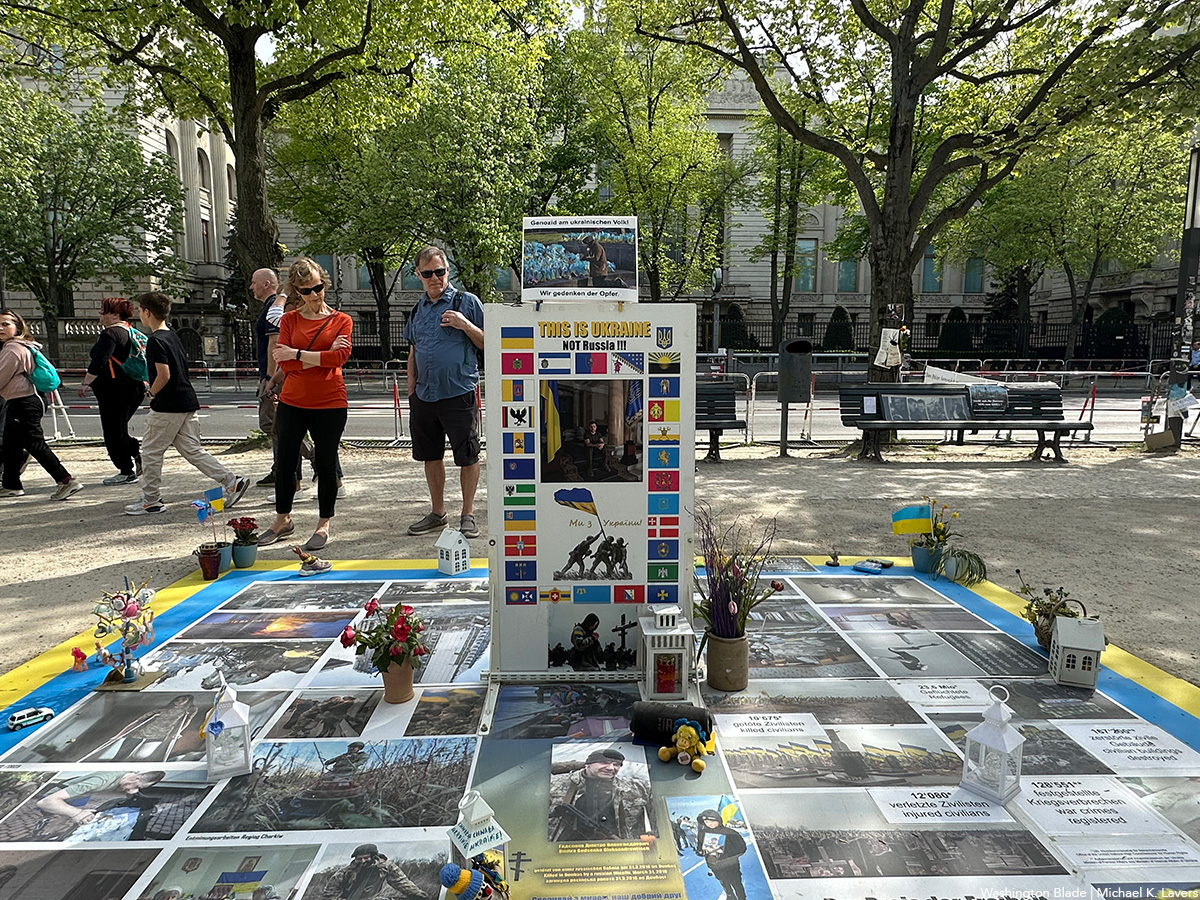
Shapoval’s mother remains in Dnipro, a city on the Dnipro River that is roughly 300 miles southeast of Kyiv.
He said the first year of the war was “pretty quiet” in Dnipro because it is not as big as Kyiv, Kharkiv, Odesa and other Ukrainian cities. Shapoval said the situation in Dnipro changed last fall.
Shapoval told the Blade a Russian missile hit a nine-story civilian building in the city.
“I had the worst day of my life because I knew that my mom was going to Dnipro,” he said.
Shapoval said the building the missile hit struck was close to his grandmother’s home.
“I was so horrified,” he told the Blade. “I was trying to call her to get in touch. She was not answering at all.”
Shapoval said his grandmother called him several hours after the attack. She told him the missile strike damaged the city’s communications infrastructure.
“It’s pretty horrible,” said Shapoval.
Shapoval spoke with the Blade hours before Ukrainian President Volodymyr Zelensky signed a controversial conscription law that seeks to replenish the country’s military. Zelensky last month also enacted a statute that lowers the minimum draft age from 27 to 25.
Shapoval said he does not want to go into the military, and has thoughts that he would die in the war. Shapoval also told the Blade he does not watch news reports about Ukraine because they exacerbate his depression.
“Just seeing these buildings destroyed and sometimes (at night when) people are sleeping there, or also (seeing) news about kids being stolen into Russia and then brainwashed there in these camps … is really bad,” he said.
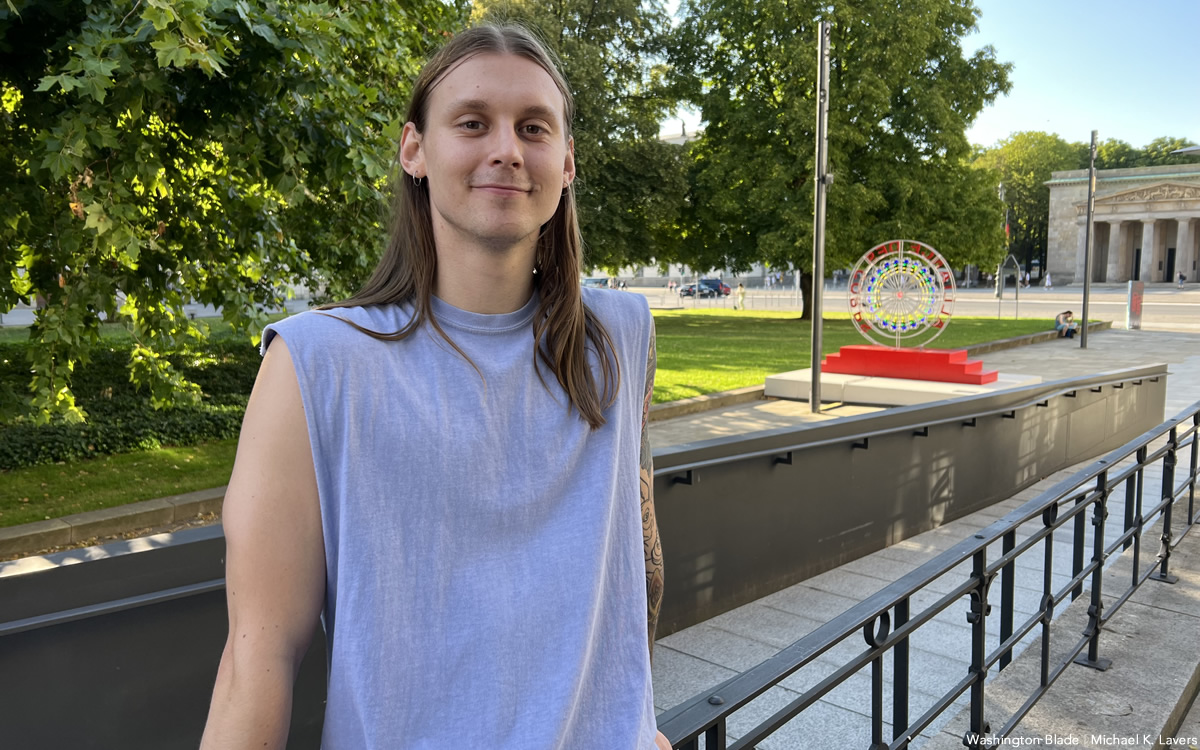
‘You’re a white refugee, so everything’s fine’
Shapoval noted support for Ukrainian refugees in Germany has begun to wane.
He recalled a conversation he had at a queer bookstore in Berlin’s Kreuzberg neighborhood during which someone who he described as German asked him what its like to be a refugee.
“Without even letting me answer without any space, he’s like, ‘Oh, but you’re a white refugee, so everything’s fine,'” recalled Shapoval.
Hamas on Oct. 7, 2023, launched a surprise attack against Israel.
Shapoval said the Israel-Hamas war in the Gaza Strip has pushed the conflict between Ukraine and Russia and the plight of Ukrainian refugees out of the headlines. He also recalled an exchange he had with a Syrian woman with whom he had become friends in Berlin after Oct. 7.
Shapoval said she wrote in an Instagram post that “one or two years of war in Ukraine, this amount of kids died and two months of war in Palestine, this amount of kids died.”
“I’m like, what the fuck is that?” he recalled. “It’s not a competition of dead babies.”
“The fact you put two in comparison already makes one side less valuable and one side more valuable, but it’s also different pain,” added Shapoval. “I know that it is also horrible there … it seems like people are not understanding that.”
Shapoval said he reached out to her and tried to explain his perspective.
“It’s a bit hard right now,” he told the Blade.
-
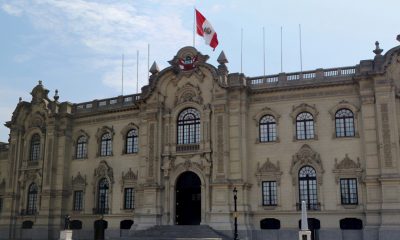
 South America22 hours ago
South America22 hours agoPeruvian government classifies transgender people as mentally ill
-
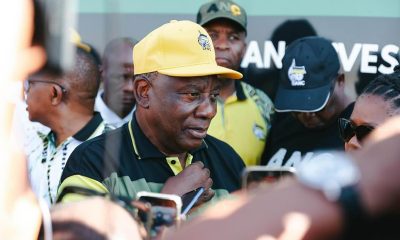
 Africa5 days ago
Africa5 days agoSouth African president signs new hate crimes, hate speech law
-

 District of Columbia1 day ago
District of Columbia1 day agoMeet Jay Jones: Howard’s first trans student body president
-
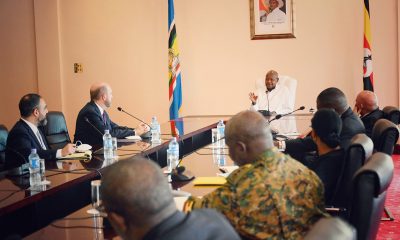
 Africa3 days ago
Africa3 days agoUgandan president meets with US ambassador





